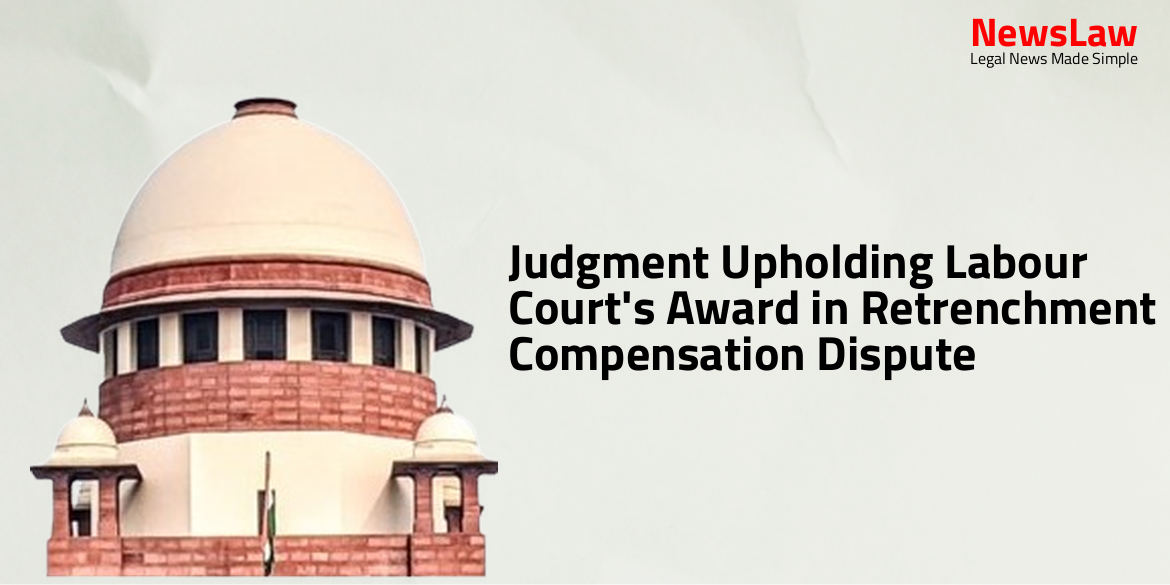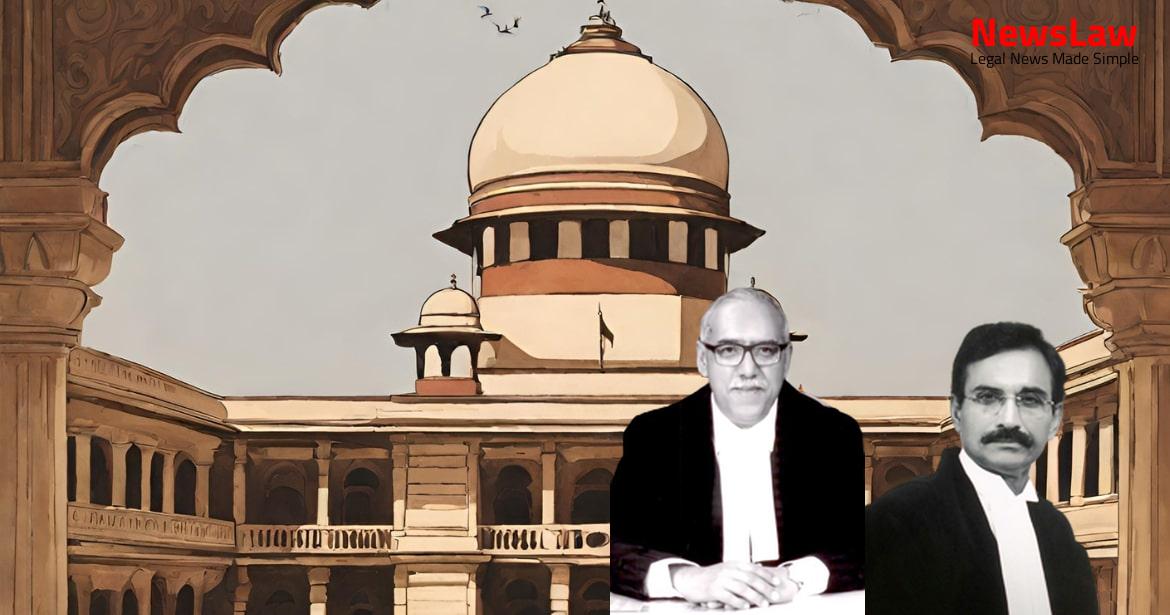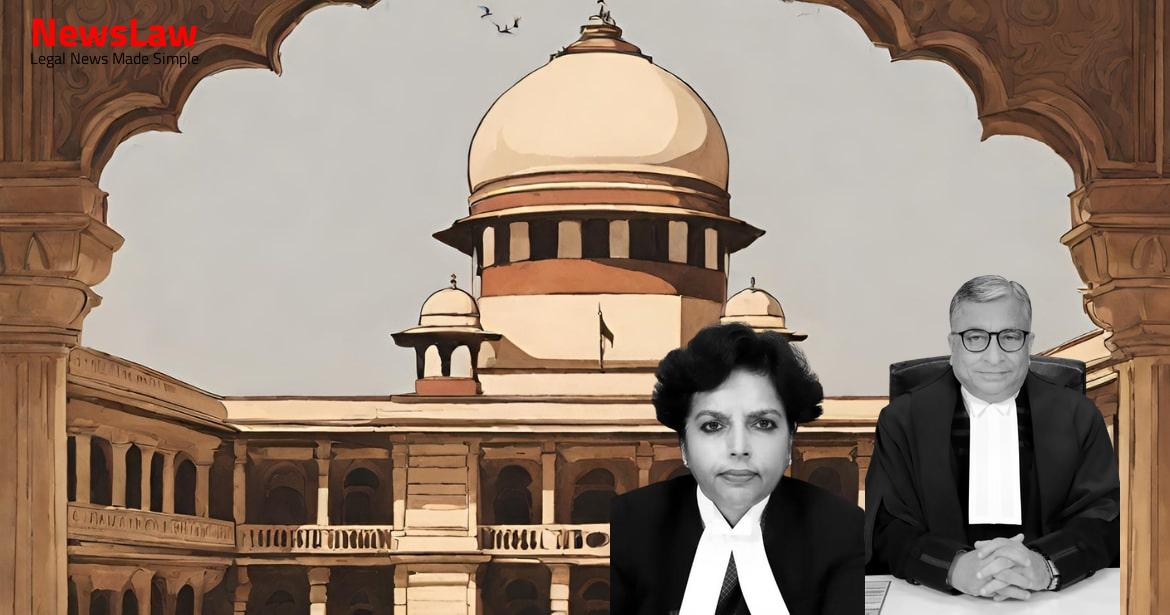In a recent judgment, the Delhi High Court upheld the Labour Court’s award in a retrenchment compensation dispute. The management has been directed to pay Rs.2,00,000/- to the workman within one month from the date of publication of the award. Interest at 9% per annum will be applicable if the payment is delayed. Stay updated with this crucial legal decision on our platform.
Facts
- The workman has consistently received salary as per the unskilled nature of work and never objected while in service.
- The judgment of the Industrial Tribunal did not provide a skilled designation in line with scheduled employment rates.
- The workman never challenged the Industrial Tribunal’s decision classifying them as unskilled laborers.
- The stay was incorrectly associated with unrelated judgments, as the circumstances were distinct.
- The Union did not push for the implementation of the impugned award, indicating lack of urgency.
- There was no stay urgency shown in the Writ Petition despite a pending Stay Application from the start.
- Orientation towards understanding that the workers were always deemed unskilled and paid accordingly.
- No claims to the contrary were raised regarding the workman’s designation during their employment period.
- Labour Court observed that Sections 9A and 25-N of the Act did not apply to the case.
- The claimant did not work from the date of transfer till the date of rejoining, so retrenchment compensation was to be given as per Section 25-F for the period worked.
- The High Court stayed the declaration of the transfer of 20 workers as illegal in 2006.
- The claimant’s service was retrenched after many years of the initial stay.
- Management unjustly included the period from transfer to rejoining in total work period for calculating retrenchment compensation.
- The Labour Court awarded a compensation of Rs.200,000 to the claimant plus 9% interest till payment.
- The Labour Court rule was in favor of the claimant due to management not paying skilled/semi-skilled wages and the imminent closure of business.
- The issue of back wages beyond the date of the award will be decided by the High Court later.
- The management calculated retrenchment compensation based on the claimant’s last drawn salary, not the skilled/semi-skilled wages ordered by POIT in 2009.
Issue
- The issue before the Court is whether the stayed award of the Industrial Tribunal can be relied upon by the Labour Court for determining entitlement to compensation.
- The Workman in question was receiving the salary of an ‘unskilled’ laborer from the date of appointment until the time of retrenchment.
- The Court has framed the two issues to be addressed: the first regarding the termination and retrenchment of the workman in accordance with Section 25F of the Act, and the second regarding the reliance on the stayed award by the Labour Court.
- The key question for the Court to decide is whether the Labour Court’s award should be interfered with under Article 226 of the Constitution of India.
Arguments
- The petitioner’s counsel argued that the impugned award was passed without considering all the facts and circumstances of the matter.
- Despite the Tribunal declaring transfer orders illegal, the petitioner reinstated the workman only to avoid liability under section 17B of the Act.
- The petitioner is accused of punishing the workman for forming a union to address grievances before labor authorities.
- It is contended that the batch of petitions is not clear-cut regarding malafide intention in the payment of retrenchment compensation.
- The writ jurisdiction of the Court is constrained from re-evaluating evidence unless illegality or perversity is shown, which the petitioner failed to demonstrate.
- The petitioner’s contention is that the Labour Court was justified in passing the impugned award.
- The Ld. ARM argued against granting designation to the claimant based on correct calculation of retrenchment compensation and notice pay
- The claimant had filed a case against his transfer and it was determined by POIT that he was doing unskilled job
- The award from the transfer case was not challenged by the claimant before any forum, making it final and operating as res-judicata
Analysis
- The learned Labour Court correctly observed that the retrenchment of the worker was in violation of Section 25-F of the Act as compensation was not provided as per the 2009 award.
- The management erred in not calculating notice pay and compensation based on the worker’s skilled/semi-skilled designation as determined by the Industrial Tribunal.
- The attendance register for the preceding 12 months prior to retrenchment indicated that the worker was not surplus, contradicting the management’s claim.
- The workman had rendered continuous service for over 20 years, supporting the entitlement to proper compensation based on the skilled/semi-skilled category.
- The designation case decided in favor of the workers in 2009 was a crucial factor in determining the appropriate compensation for the retrenched worker.
- The seniority list and attendance records were crucial evidences considered by the Labour Court to support the worker’s claims.
- The petitioner’s argument regarding the non-applicability of the award stayed in 2013 was rejected, as the compensation based on designation was rightful even after the stay.
- The transfer case issues were distinct from the concerns of retrenchment and compensation, as highlighted by the POIT’s observations.
- The findings of the Labour Court were based on a detailed examination of the facts and evidence presented, ensuring a fair decision in favor of the worker.
- The stay of the designation matter did not diminish the worker’s entitlement to compensation as per the skilled/semi-skilled designation, as established by the Labour Court.
- Section 144 CPC speaks about varying, reversing, setting aside, or modifying a decree.
- The successful party at the final stage can demand restitution for benefits earned by the other party during the interim stage.
- Restitution is an obligation of the court to restore parties to their original positions.
- Case examples like Nava Bharat Ferro Alloys Limited v. Transmission Corporation of Andhra Pradesh Limited and State of Rajasthan v. J.K. Synthetics Limited illustrate the principles of restitution.
- The Court must restore parties to their pre-stay positions upon dismissal of the writ petition.
- The distinction between repeal and suspension of laws is important, with the former removing the law entirely and the latter putting it on hold.
- Shree Chamundi Mopeds Ltd. v. Church of South India Trust Assn. elaborates on the effects of quashing and stay in legal proceedings.
- The court must ensure parties are in the same position post-dismissal as they would have been.
- Section 25-F of the Act sets conditions for retrenchment of a workman.
- Employer must provide one month’s notice or pay wages in lieu of notice.
- Compensation equivalent to fifteen days average pay for every completed year of service must be paid at the time of retrenchment.
- Continuous service for at least one year with the employer is required for a valid compensation claim.
- The Court found no merit in the batch of petitions and concluded that there was no illegality in the findings recorded by the Labour Court.
- The petitioner management failed to present any convincing arguments in their favor in the petitions.
- The Labour Court’s findings in the respective writ petitions were consistent, indicating that the workmen were illegally retrenched without adequate compensation based on their designation.
Decision
- The issue before the Labour Court was to determine the legality and justification of the workman’s retrenchment.
- The management is directed to pay Rs.2,00,000/- to the workman within one month from the date of publication of the award.
- Interest at 9% per annum will be applicable if the payment is delayed.
- Each party is to bear their own costs.
- The award is to be sent to the Govt. of NCT of Delhi for publication.
- The file is to be consigned to the record room.
- The impugned award is upheld by the Court, and the connected petitions are dismissed.
- The management must pay the compensation awarded to the workmen within three months.
- The judgment is to be uploaded on the website immediately.
- Pending applications are also dismissed.
- The judgment of the Presiding Officer of the Labour Court is upheld.
Case Title: SAWHNEY RUBBER INDUSTRIES Vs. SH. OM PRAKASH (2024:DHC:4569)
Case Number: W.P.(C)-6523/2020



